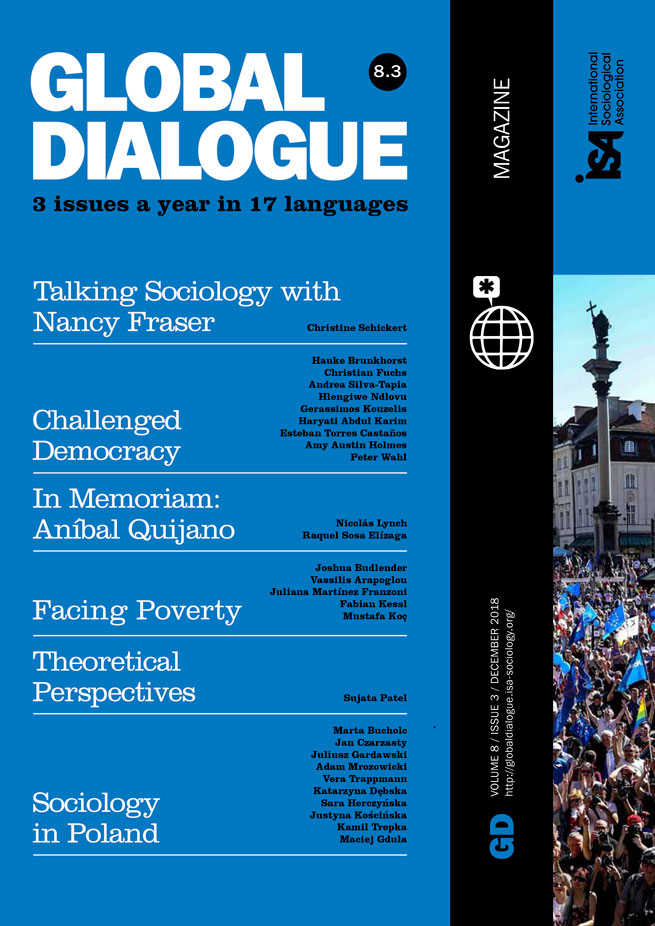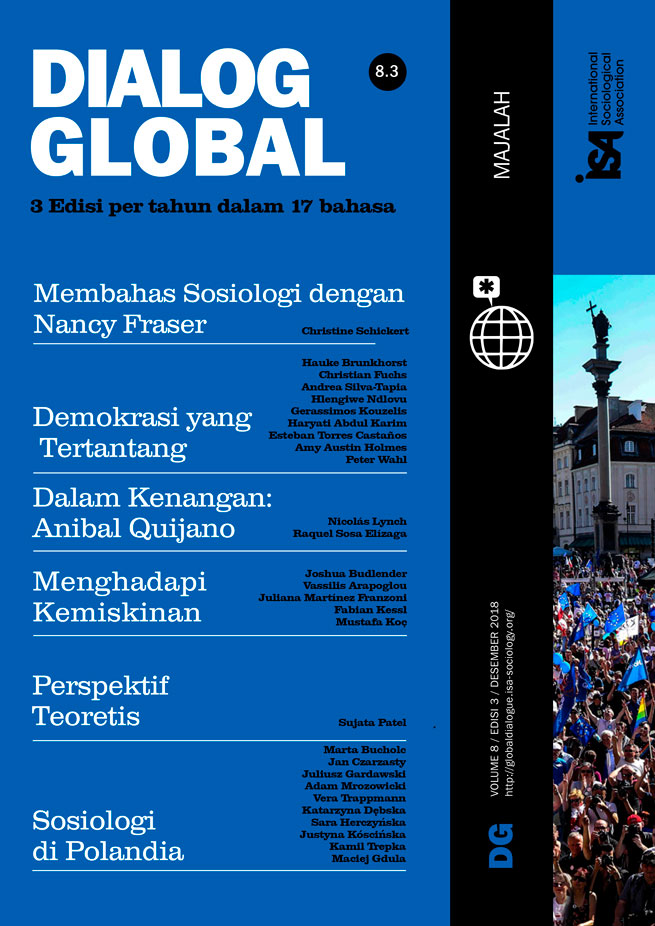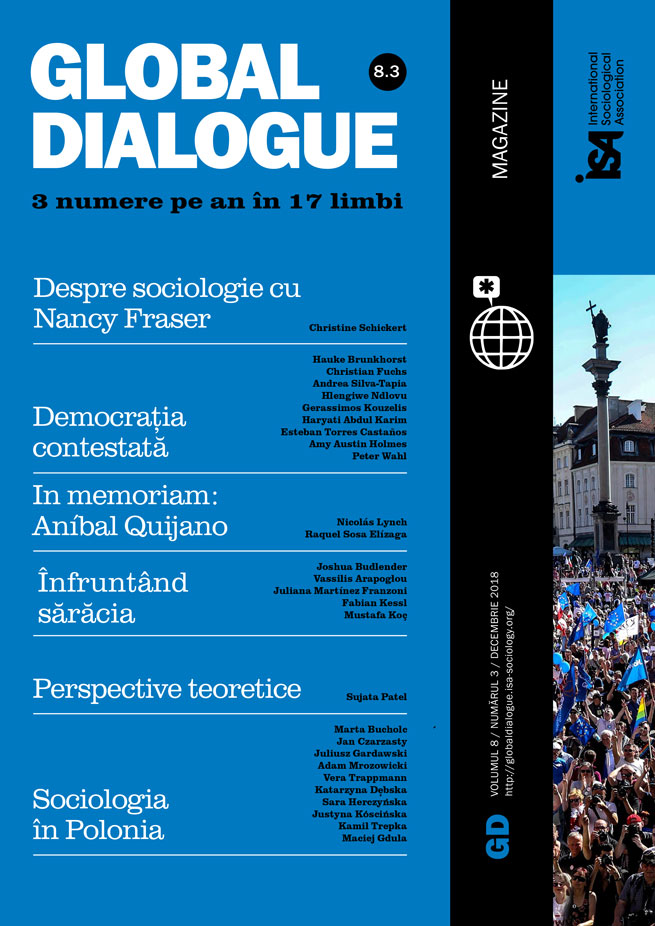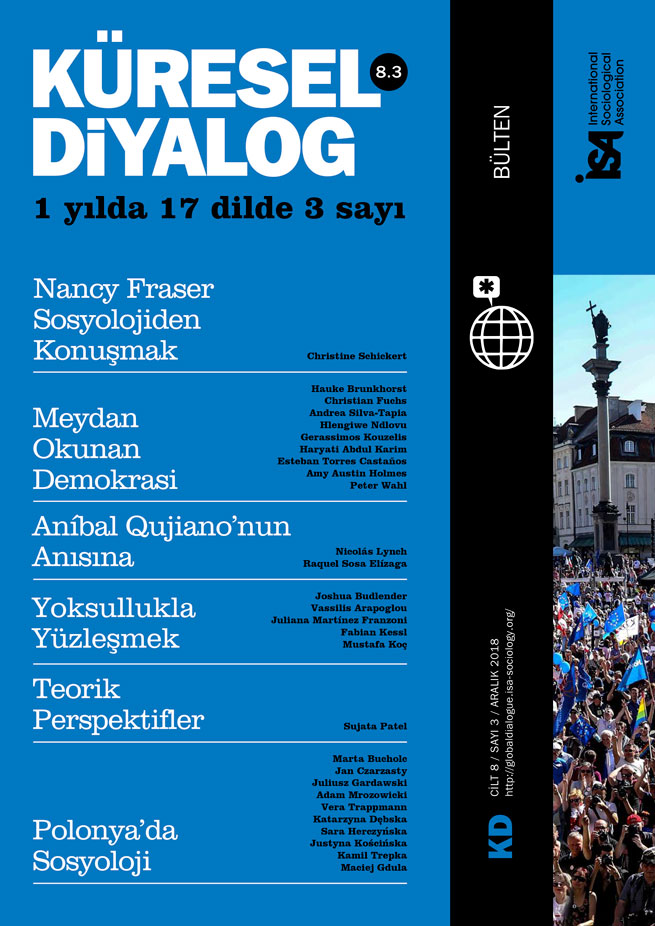Feminism in Neoliberal Times: An Interview with Nancy Fraser
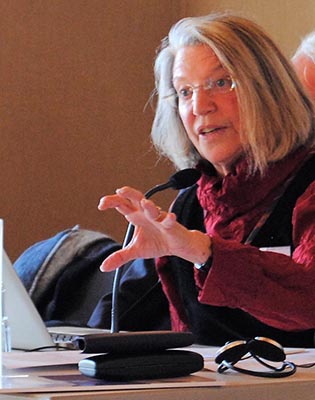
December 04, 2018
Nancy Fraser is one of today’s most eminent critical theorists and feminist thinkers. She is Professor of Philosophy and Politics at the New School for Social Research in New York. In a number of widely read publications, among them Redistribution or recognition? A Political-Philosophical Exchange (2003), a debate with Axel Honneth, she develops a theoretical concept of justice and injustice, arguing that justice can be conceptualized in two ways: as distributive justice and justice of recognition. She claims that both redistribution and recognition are central to fighting today’s injustices. She has also published a large number of books and articles on feminism and feminist issues, both as a scholar and as an activist, among them Fortunes of Feminism: From State-Managed Capitalism to Neoliberal Crisis (2013). Here she is interviewed by Christine Schickert, administrative director of the Research Group on Post-Growth Societies at the Department of Sociology of the University of Jena, Germany and assistant editor of Global Dialogue.
CS: It has been almost ten years since your article “Feminism, Capitalism and the Cunning of History” was published. In it you basically argue that mainstream or liberal feminism has been co-opted by capitalism for its own ends. Could you outline your argument here?
NF: I was writing that paper in a very specific moment, which was just when the world financial crisis was unfolding and Barack Obama, talking all about hope and change, had been elected to the presidency. It was a period in which everybody acknowledged that we were at a very decisive and scary moment, and there was a lot of hope that something different might happen. There was something about that moment that made me suddenly able to think about the history of these moments and the history of feminism as a whole. For a long time I had been unhappy with the direction that liberal or mainstream feminism had been taking, which I had tried to write about earlier by talking about the over-focus on recognition and under-attention to distribution, but this gave me an even clearer view of this crisis moment. My sense was that there had been a major shift in the nature of capitalist society that was running concurrently and parallel to the development of feminism. When the second wave of feminism erupted in the late 1960s and early 70s, we were really just on the cusp, and we thought that we were still operating in a secure, social democratic or state-managed capitalist regime. We thought that the gains which that regime had brought were more or less secure and that we could go from there to a more radical egalitarian and democratic world in which feminism would be a major player. What happened instead, though, was the crisis of social democracy, which was just about to unfold, and the rise of neoliberalism. This was a totally new form of capitalism, and feminists – and not only feminists but many progressive, social movement actors – were very slow to realize this; to put it simply, we were still continuing this kind of recognition-focused agenda without understanding how the political economy had changed. It was no longer just that we forgot about redistribution, it was that without realizing it – or at least many people did not realize it – we had actually been contributing something positive and essential to neoliberalism. We had given it a kind of charisma and legitimacy, allowing it to use our emancipatory, liberatory charisma as a kind of legitimation tool or alibi for the regressive new regime of political economy that was being introduced. That was the argument. Because we were in a crisis moment, apparently, in 2008-9, I thought that this was a time when it would be possible – as I said at the very end of the essay – to think big, to think outside the box, and to introduce a new kind of feminism through a shift or a course correction, in which we could be a part of a real anti-neoliberal project.
CS: I can imagine that many women who identified as feminist activists or scholars saw their work for feminist causes questioned and responded defensively to your analysis.
NF: I was expecting when I published the essay that I would get a lot of pushback. The reality is that I actually got much less than I expected, at least from the sort of academic feminist circles that I travel in. Even if people did not completely agree with me, they thought that I was on to something and that something had gone wrong with feminism. There was a wide sense that the world we thought we were going to make is not the world we actually are living in. There were many more people than I expected who were willing to think about this thesis. I feel that it is neither an accusation nor a question of blame, rather a pressing need to understand how a certain form of progressive, neoliberal hegemony was able to construct itself and win the battle for the common sense of the time. I think we need to understand what role we might have played unwittingly, so that we can do better and make a course correction. No white feminist liked hearing from black women that we had, without intending to, replicated a lot of assumptions that were either tied to white supremacy or were not at all sensitive to the different situation of women of color. But we had to listen to it and we had to absorb it, and I think the same is true about this. The first reaction is often defensive, but you cannot just remain in that state. CS: But I assume liberal feminists don’t see themselves as furthering a neoliberal agenda but fighting for greater gender equality… NF: The question here is: what do we mean by equality? Equality is another one of those essentially contested concepts with competing interpretations of it. The liberal interpretation is what I would call a meritocratic interpretation. It is the idea that in the end women are individuals and they should, just like men, have the opportunity and the chance to go as far as their talents will take them as individuals. Equality here means trying to dismantle the barriers that cause discrimination; the problem of inequality is one of discrimination, and by removing discriminatory barriers, these talented, individual women can go as high as men. The first thing I want to say is that this is a class-specific ideal. What it really means is that they want to be equal to the straight, white men of their own class. What feminism means to me is a more robust and radical idea of equality which is really about not diversifying sexual hierarchy but abolishing it – or greatly lessening it in any case. So this idea of meritocratic equality I would not even really call equality. Liberal meritocracy as an interpretation of equality has brought some real gains but only for a very thin stratum of women. The overwhelming majority of women do not crack any glass ceiling; they are stuck in the basement, they are cleaning up and sweeping up the broken pieces of glass. I am part of trying to develop an alternative kind of feminism to this liberal, meritocratic feminism.
CS: Since the election of a number of right-wing leaders in the United States and Europe, there has been a debate around the question of whether a supposedly one-sided focus on “identity” in social movements at the expense of addressing economic inequalities lies at the root of right-wing successes. What does this debate mean for a feminist movement that on the surface has as one mobilizing factor our shared identity as women?
NF: I think we could address it at different levels. At the conceptual level, I have always argued that the idea that there are some movements which are identity movements and some movements which are class movements is a misunderstanding. Class-based movements have two aspects. They have a structural aspect, which I tried to theorize in terms of distribution, but there are other ways to explain it, and they always have an identity aspect in the sense that all class struggles, even when they are not explicitly focused on this, convey an image of whose struggle it is – of gain or of loss, etc. I do not think feminism is any different; women’s subordination in capitalist societies is every bit as structurally grounded as class exploitation is. So I get annoyed when people say that feminism is an identity movement and this other thing is a class movement. I think our claims are as deeply structural and as rooted, as they used to say, in primary contradictions. At the same time, all movements have an identity basis. The identity basis can lead you astray, though. There is now a buzzword, intersectionality. I have some criticisms of that language, but the main point is right. The main point is that not all women are in the same boat, not all working-class people are in the same boat, and not all people of color are in the same boat. There are these cross-cutting structural asymmetries; asymmetries of power, of advantage and disadvantage, etc. A feminism that says “we are not going to look at those issues, we are just going to talk about women” is going to end up speaking only for a privileged stratum of women. That is what I think the liberal, meritocratic feminism has done. Feminism has to be every bit as much about and sensitive to class, race, and all the other major axes of oppression in capitalist societies.
CS: You have yourself, along with a number of other prominent feminist thinkers, recently addressed this question of creating a more inclusive feminist movement and developed the idea for a “feminism for the 99 percent.” Could you tell us more about this initiative?
NF: It is a kind of populist language which we borrowed from Occupy. You may say that from a strictly sociological point of view it is not fully rigorous, but it has tremendous mobilizing power and conveys instantly that this is not the feminism of Christine Lagarde and of Hillary Rodham Clinton. It is almost a “fighting words” way of describing yourself as being against the crack-the-glass-ceiling, lean-in feminism. It is precisely an attempt at a course correction. What happened in recent decades, as I diagnosed it in that essay, was that in a sense feminism – or important, dominant currents of feminism – had been somehow sucked into a kind of alliance or, as Hester Eisenstein called it, a “dangerous liaison” with these sorts of neoliberal forces and was serving as an alibi for them. Therefore, the antithesis of the neoliberal forces which represent the 1% is a feminism that represents the 99%. It was a very simple rhetorical strategy. The interesting thing about it – and it was just a few of us who dreamed it up – was that it actually stuck and got some traction, which to me shows that there was something there waiting for something like this to come along. There was a real felt need for it. This feminism for the 99% is really concerned with the situation of the overwhelming majority of women who do the lion’s share of social reproduction and waged work and whose conditions of life are deteriorating under this regime of neoliberal, financialized capitalism. This form of capitalism requires many more hours of paid work per household than the previous kind of capitalism, is assaulting social welfare and all kinds of social protection regimes at the national level, and wields debt as a weapon. Women are on the front lines of this assault on social reproduction, and the feminist 99% is centering these aspects and really tying them to the problem of this form of capitalism. We are trying to name the system, as we used to say in SDS (Students for a Democratic Society), and whereas liberal feminism is about getting access to the system, we are talking about ways in which the system is making our lives unlivable.
CS: But 53% of white women in the United States voted for Donald Trump in 2016, a candidate who is not only openly sexist but who doesn’t concern himself with any kind of gender equality. Can the idea of a feminism for the 99% reach these women?
NF: Not all of them, but I think a good part of them. Of course, some are just like men who voted for Trump; they are Republicans who hate Hillary Clinton and would just not vote for her, business people, those who want free markets, etc. A lot of them are the usual suspects who vote Republican, but not all. Some of them are working-class women from deindustrializing areas that have been absolutely devastated by the shift of manufacturing outside of the United States and some of them are Southern women. There was a new industrialization in the south, often un-unionized, which has been devastated in recent years as well. They have been clobbered as well. There are also rural women, small town women where the unemployment is horrible, opioid addiction is rampant, and so on and so forth. The point is that these are not the people who are going to benefit from lean-in feminism or from any version of progressive neoliberalism. There have not yet been too many serious, rigorous, ethnographic studies of why they voted as they did, but there will be. In the few interviews that I have seen – and this is not systematic – you can get a sense of what people were feeling. When they heard the Hollywood Access tapes (which was just before the election when Trump was bragging about grabbing women “by the pussy”), they said things like that it made them feel real bad, they did not like it, it was disrespectful, and they did not want him to talk like that, but given everything else, he was still their best shot. In addition, I think there are also people who might not like the way he talked about Mexicans or Muslims, but even if it was terrible that he was disrespectful to those people to that extent, nevertheless he was talking about making things better for them. Of course, I do not mean to say that all Trump supporters are racist. There are Trump voters who really are racist, but those we cannot reach and I am not concerned about them. I am concerned about the ones – and I think there is a substantial chunk of them – who could be reached by the left. We know that there were 8.5 million Americans who voted for Trump in 2016 who had voted for Obama in 2012. The most important point is that by the time the November election came, the only other option was Hillary Clinton, and that meant progressive neoliberalism. Bernie Sanders had represented something else, but he was out of the game at that point.
CS: So how do you think these 8.5 million Americans can be reached by the left?
NF: The politics that I am supporting, of which feminism for the 99% is one part, is to try to revive something like the Sanders’ option (I am only using his name as a shorthand). This involves taking every progressive social movement, trying to split it between those who are for the 99% and those who are for the 1% – of course this is crude, but the idea should be clear – and putting them all together. What you had with Sanders was the idea that you could combine a lot of pro-working-class and pro-working-family, bread-and-butter issues: amongst others, Medicare for all, breaking up the banks, and free college tuition. When I say working class, I do not just mean white people. In the United States, the working class has a lot of people of color and women in it, and they think of themselves increasingly as working class. So take these bread-and-butter issues that benefit the 99% and join them up with things like reforming the criminal justice system, which is a pressing issue for people of color, with reproductive freedom, which is a pressing issue for women, and with other issues equally structural and material which are – though they should not be – thought of as identity issues. So I think feminism for the 99% is an example for other social movements to follow. So let us have, for example, environmentalism for the 99%. We have these currents, but let us really call them that and put them together in an obvious way.
Nancy Fraser <frasern@earthlink.net>





